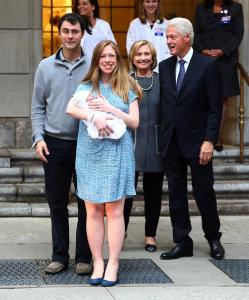
Chelsea Clinton, Marc Mezvinsky, Charlotte Clinton Mezvinsky, Hillary and Bill Clinton. Photo from www.nydailynews.com
When Chelsea Clinton gave birth to the first Clinton grandchild, the idea of grandparent’s rights came to mind.
Colorado has specific statutes dedicated to protecting children’s rights and grandparent’s rights. See Section 19-1-117 C.R.S. at the end of this blog.
With the different roles grandparents play in children’s lives from barely present to raising a child as their own, it is important to understand all 3 perspectives of grandparent’s rights.
THE CHILD’S POINT OF VIEW
If your child has consistently shared a relationship with his grandparents, it is your duty as a parent to continue to foster that relationship for your child’s sake. Sometimes spending time with grandma can be an escape from a parent’s juggled lifestyle while trying to figure out the how-to of being a single parent. It can also be true of involving the other parent’s parents.
Your child deserves the least amount of change as possible through divorce. Consideration is given to Grandparent rights with the understanding the child will be able to see each side of the family during that respective parents parenting time, and during the vacation and holiday schedule.
THE PARENT’S POINT OF VIEW:
Parenting rights are held in high regard. If a parent proves capable of making decisions in the best interests of their child, the law is not likely to interfere. The law in Colorado is structured with the presumption that the parent is acting in the best interests of the child when determining where the child spends their time.
We sometimes see the situation, in a high-conflict divorces, where one parent is awarded the majority of the parenting time and all of the decision-making, and won’t let the ex-spouses parent’s spend time with the child.
Grandparents may file a motion for visitation if there is clear and convincing evidence that denying time with them is not acting in the child’s best interests.
THE GRANDPARENT’S POINT OF VIEW:
Some grandparents are involved in their grand children’s daily lives. When a divorce between the parents happens, this relationship may be affected. In some situations, especially in with families suffering substance abuse issues, the children may move in with their grandparents. In other situations, a parent may attempt to terminate or ruin the relationship through divorce.
Grandparents should work towards offering support before threats; understanding before undermining, and assume the secondary role as grandparent to the parent and child relationship. Legal measures are an uphill battles for grandparents.
If, on the other hand, you are a grandparent who is now the parent, you must do what you can to protect the child from the parental conflict of divorce or an unstable life.
You may have legal grounds to have parental responsibilities rights allocated to you and receive a support order child support to help support your grandchildren financially.
Section 19-1-117 C.R.S. provides the following:
19-1-117. Visitation rights of grandparents or great-grandparents
(1) Any grandparent or great-grandparent of a child may, in the manner set forth in this section, seek a court order granting the grandparent or great-grandparent reasonable grandchild or great-grandchild visitation rights when there is or has been a child custody case or a case concerning the allocation of parental responsibilities relating to that child. Because cases arise that do not directly deal with child custody or the allocation of parental responsibilities but nonetheless have an impact on the custody of or parental responsibilities with respect to a child, for the purposes of this section, a “case concerning the allocation of parental responsibilities with respect to a child” includes any of the following, whether or not child custody was or parental responsibilities were specifically an issue:
(a) That the marriage of the child’s parents has been declared invalid or has been dissolved by a court or that a court has entered a decree of legal separation with regard to such marriage;
(b) That legal custody of or parental responsibilities with respect to the child have been given or allocated to a party other than the child’s parent or that the child has been placed outside of and does not reside in the home of the child’s parent, excluding any child who has been placed for adoption or whose adoption has been legally finalized; or
(c) That the child’s parent, who is the child of the grandparent or grandchild of the great-grandparent, has died.
If you have any questions or concerns about your situation please call us at 720-943-7707 or Email Us!


